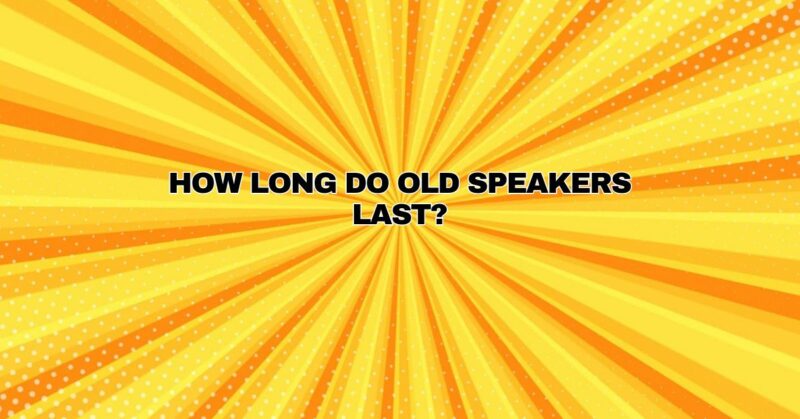Old speakers, often considered vintage or classic, hold a special place in the hearts of audiophiles and music enthusiasts. They carry with them the nostalgia of eras gone by and often boast a unique charm and sound quality that modern speakers may not replicate. However, as speakers age, their performance can be affected, leading many to wonder: How long do old speakers last? In this comprehensive article, we will explore the factors that influence the lifespan of old speakers and offer insights into maintaining and preserving these cherished audio components.
Factors Affecting the Lifespan of Old Speakers
- Build Quality: The quality of materials and craftsmanship used in the construction of a speaker plays a significant role in its longevity. High-quality speakers made with durable components tend to last longer than cheaper, mass-produced models.
- Usage Patterns: How speakers are used and the conditions they are subjected to have a substantial impact on their lifespan. Speakers used at moderate volumes and kept in a controlled environment are likely to endure longer than those exposed to extreme conditions, such as high humidity, temperature fluctuations, or excessive dust.
- Maintenance: Regular maintenance can extend the lifespan of old speakers. Cleaning the speaker cones, checking and tightening loose screws, and replacing worn-out parts like foam surrounds can help keep speakers in good working condition.
- Power Handling: Overdriving speakers with excessive power can lead to damage and a shortened lifespan. Matching speakers with an appropriate amplifier and following recommended power handling guidelines is essential to prevent damage from excessive wattage.
- Speaker Type: The type of speaker also affects its longevity. Cone speakers, horn drivers, and ribbon speakers each have their own strengths and weaknesses. Some may be more prone to wear and tear over time than others.
- Exposure to Elements: Exposure to elements such as sunlight, moisture, and dust can deteriorate speaker components and housing materials. Storing speakers in a controlled environment away from direct sunlight and humidity extremes can help preserve their condition.
- Age: Naturally, the age of the speaker itself is a factor. Most speakers will experience some level of wear and tear over time, regardless of usage or maintenance. This can affect performance and longevity.
How Long Can You Expect Old Speakers to Last?
The lifespan of old speakers can vary widely depending on the factors mentioned above. However, as a general guideline:
- High-Quality Vintage Speakers: Well-built vintage speakers from reputable manufacturers can often last for several decades. In some cases, they may continue to perform exceptionally well even after 30 years or more.
- Regular Speakers: Speakers that have been used and maintained properly can typically last 10 to 20 years or more. Regular maintenance and careful handling can significantly extend their life.
- Cheaper or Lower-Quality Speakers: Speakers with lower build quality may have a shorter lifespan, potentially lasting only 5 to 10 years before experiencing noticeable degradation in sound quality.
Preserving and Extending the Lifespan of Old Speakers
If you own or plan to acquire old speakers and want to maximize their lifespan, consider the following tips:
- Regular Maintenance: Clean speaker cones and housings, inspect for loose parts, and replace worn-out components like foam surrounds.
- Proper Storage: Store speakers in a cool, dry place away from direct sunlight and extreme temperatures. Using dust covers when not in use can also help protect them.
- Moderate Usage: Avoid overdriving speakers with excessive power. Use an appropriate amplifier and follow recommended power ratings.
- Avoid Moisture: Protect speakers from excessive humidity and moisture, as it can lead to mold, corrosion, and deterioration of components.
- Consult Professionals: If you notice significant issues with your old speakers, it may be worthwhile to consult a professional speaker technician or repair specialist. They can assess the condition and recommend necessary repairs.
Conclusion
Old speakers can offer a unique listening experience and hold sentimental value for many enthusiasts. While the lifespan of old speakers can vary based on numerous factors, careful maintenance, proper usage, and a favorable storage environment can significantly extend their life. With the right care, you can continue to enjoy the rich, vintage sound of your cherished speakers for years to come, preserving both their historical significance and your appreciation of audio excellence.


